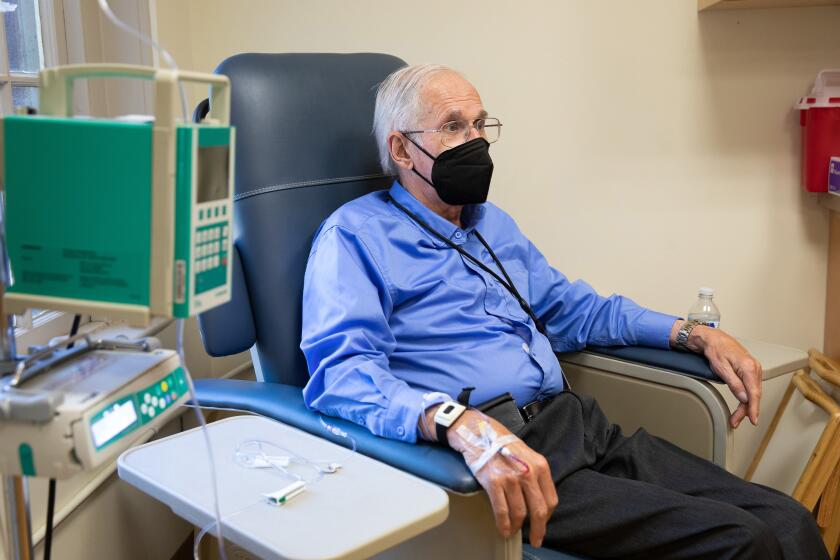Op-Ed: Overhyped Alzheimer’s treatments betrayed patients’ hopes. Here’s how science should change

America’s science policies are changing. America’s scientists need to change with them. The recent controversies over the Food and Drug Administration’s accelerated approval of an Alzheimer’s treatment are a lesson in the costs of failing to do so.
A year ago, the FDA fast-tracked Biogen’s aducanumab — the first new Alzheimer’s drug in almost 20 years — even after an expert panel nearly unanimously recommended against giving it the green light. The decision has been so contested that lawmakers are now trying to change the FDA’s accelerated approval process.
Besides fueling controversy, the approval is a rare reveal into the hidden workings of America’s scientists — and how those workings can be flawed.
When the FDA approved Aduhelm, our healthcare system was not ready to shift from researching Alzheimer’s to treating it. Now we have a chance to learn.
The purpose of accelerated approval is to allow people with serious, life-threatening diseases lacking effective treatments to take experimental treatments the agency hasn’t yet approved as “safe and effective.” The FDA backed aducanumab based on the drug’s ability to reduce beta-amyloid, one of Alzheimer’s defining pathologies. There isn’t yet data that show whether Biogen’s drug helps patients by slowing their progressive disabling cognitive impairments.
Accelerated approval and policies such as “right to try” and expanded access allow patients to take unproven treatments. These policies share a common rationale: Scientists need to listen to patients — and what they’re often hearing is desperation. In explaining aducanumab’s approval, FDA scientists said that patients and their families made it clear they’re willing to accept the drug’s uncertainties and risks to access its potential benefits.
There’s nothing wrong with policies that respond to patients’ desires. The problem is that policymakers and the public too often ignore how scientists can also be driven by personal interests, including desperation.
Following the aducanumab decision, the press uncovered sharp debates within the FDA during the drug evaluation process. Some staff scientists were so committed to approval they had close contact with Biogen employees who were reportedly desperate for the drug to get approved. Some agency officials collaborated with Biogen early on to chart a road map to approval, flouting the usual process of expecting the company to make its case independently. The Department of Health and Human Services’ Office of Inspector General is now investigating these relationships. Three FDA advisors resigned over the approval.
Aducanumab wasn’t the only potential Alzheimer’s treatment overhyped this past year. Cassava Sciences’ drug simufilam, promoted as the first to significantly improve cognition of Alzheimer’s patients, was rewarded more than $20 million in National Institutes of Health grants which it leveraged into massive investments to support the drug’s development. But in August 2021, a whistleblower claimed there was data manipulation and flawed methods. The company now faces investigations by the NIH and the Securities and Exchange Commission.
These cases have historical precedent. The 1986 study premiering what would become the first FDA-approved Alzheimer’s treatment, tacrine, was celebrated in an editorial in the New England Journal of Medicine as “a triumph for the scientific method.” Then in 1991, an FDA investigation concluded that flaws in the study’s design and conduct were so significant that it wasn’t so much a clinical trial but a series of anecdotes. In a candid essay, the Journal’s editor revealed the study’s peer reviewers shared many of the FDA’s concerns but still recommended publishing because, although imperfect and preliminary, the study would encourage further research.
U.S. regulators have OKd the first new Alzheimer’s drug in nearly 20 years, against the advice of their own outside experts.
Yet again, scientists’ desires to inspire and hasten the field overrode their processes and inflated hope.
Scientists’ professional judgments can also be shaped by money as a key measurement of the importance of research and a scientist’s reputation. In the biopharma world, potential revenue is often used to denote how “innovative” a discovery is: The more money a product is likely to generate, the more it’s seen as innovative.
But facts don’t support the conflation of profit with true innovation, meaning products that serve an unmet medical need or advance patient care. A 2017 Government Accountability Office report found that from 2006 to 2015, two-thirds of biopharma companies increased their annual profits. Yet in that time the proportion of new products deemed innovative remained a flat 13%. Per the “revenue equals innovation” mindset, aducanumab first appeared quite innovative: Biogen initially priced the drug at $56,000 per patient per year. Then intense scrutiny of its clinical value caused the company to slash the price in half.
Guidelines exist to prevent scientists’ personal motivations from clouding their work, including disclosures around conflicts of interest and rules to dictate appropriate relationships with companies. But they’re not enough. Scientific norms and values need to change too.
Scientists inevitably face career and other pressures to pursue large grants and boost their results’ value in the marketplace. But that should not come at the cost of scientific standards. In communications with the public, researchers ought to explain the evidence showing how their science will improve health and well-being. Instead of simply declaring a new drug such as aducanumab to be “innovative,” they should be forthright about what makes it innovative and any limitations in their research.
Regulators also need to change to better fulfill their role as gatekeepers. The FDA, for example, composes the text on a drug’s label to explain its risks and benefits. Labels for accelerated approval drugs explain that full approval is contingent “upon verification of clinical benefit in confirmatory trials.” But the label should say what that means in plain language. For aducanumab, that means explaining that the drug hasn’t been proved to slow down losses in cognition or day-to-day function. The FDA should also provide a timeline of when the full clinical data will be available.
Scientists’ failure to reckon with their uncertainties and personal motivations has real consequences for patients. Medicare announced in April that it won’t cover aducanumab for patients except in clinical trials; Biogen will “substantially eliminate” commercial production of the drug. Instead of fulfilling patients’ hope, the accelerated approval of aducanumab betrayed it — and further undermined the credibility of public processes around science.
Jason Karlawish is a professor at the University of Pennsylvania’s Perelman School of Medicine and author of “The Problem of Alzheimer’s: How Science, Culture and Politics Turned a Rare Disease into a Crisis and What We Can Do About It.” @jasonkarlawish
More to Read
A cure for the common opinion
Get thought-provoking perspectives with our weekly newsletter.
You may occasionally receive promotional content from the Los Angeles Times.












